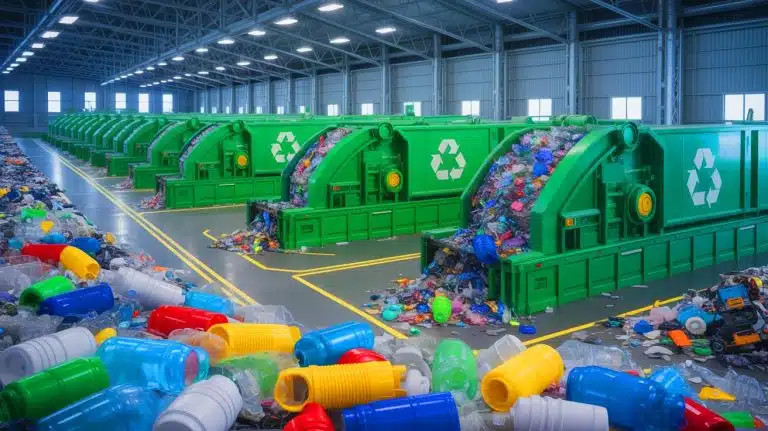| IN A NUTSHELL |
|
Plastics are omnipresent in modern life, from food packaging to medical devices. Despite their utility, the environmental cost is significant, with nearly three-quarters of plastics ending up in landfills or polluting natural habitats. A mere 9% is actually recycled. Researchers are urging a change in how we manage plastic waste, emphasizing the need for more efficient recycling processes and the exploration of viable alternatives. A team at the University at Buffalo, led by Dr. Aurora del Carmen Munguía-López, is exploring how process systems engineering, enhanced by machine learning, can transform plastic waste management. Their research delves into options, trade-offs, and technical challenges, aiming for a sustainable future for plastics.
Why Plastics Still Matter
Despite the negative perception, plastics play a crucial role in various industries. They help in preserving food, reducing the weight of vehicles to save fuel, and making medical equipment more affordable and safer. Dr. Munguía-López emphasizes that eliminating plastics is not currently feasible. The issue lies not in the material itself but in its post-use management. Without better waste systems, plastics contribute to ocean pollution, fill landfills, and even end up in human bodies, causing health issues such as cancer and respiratory problems. The goal is to manage plastics smarter, not eliminate them entirely.
Current waste management systems are inadequate, leading to widespread environmental contamination. By enhancing these systems, we can significantly reduce the negative impact of plastics. The focus should be on improving recycling methods and developing new technologies to handle plastic waste more effectively. The challenge is to balance the advantages of plastics with the need for environmental preservation.
Smarter Recycling With Solvents and AI
Traditional recycling methods are limited to certain types of plastics, failing to address complex materials like multilayer packaging. Solvent-based recycling offers a promising solution by selectively dissolving specific polymers, allowing for the extraction of valuable materials from mixed plastic waste. Research by the University of Wisconsin-Madison highlights its cost-effectiveness in recycling multilayer films, although it requires careful emission management.
Combining solvent-based and traditional recycling methods can enhance recovery rates while minimizing emissions. Meanwhile, artificial intelligence is revolutionizing sorting and planning processes. With models like PlasticNet achieving high accuracy, AI can improve transportation planning, coordinate industry efforts, and simulate new policy outcomes. Dr. Munguía-López notes the necessity of AI in addressing supply chain demands, underscoring its integral role in modern recycling systems.
“Dead Batteries Still Hold Power”: The US Eyes Billions in Lithium as Nations Clash Over Resources
Are Biobased Plastics Really Better?
Biobased plastics, derived from renewable sources like corn and sugarcane, offer a seemingly attractive alternative. However, their large-scale adoption poses challenges. Land and water used for crop cultivation might otherwise be allocated to food production. Additionally, composting bioplastics requires specialized facilities, which are not widely available. Separating these plastics from traditional ones also presents consumer difficulties.
Dr. Munguía-López stresses the importance of evaluating the entire life cycle of biobased plastics, from material extraction to disposal. Without understanding the full impact, their true value remains uncertain. While promising, the transition to biobased plastics is neither simple nor immediate. Comprehensive life cycle assessments are essential to validate their environmental benefits and economic feasibility.
The Need for Systems-Level Thinking
Plastic pollution extends beyond environmental concerns, impacting social and economic realms. Addressing it requires a systems-level approach, integrating every step from product design to waste management. This involves improving waste collection, constructing appropriate facilities, and promoting consumer behavior changes. Coordination across sectors—from scientists to policymakers—is crucial.
Process systems engineering provides tools for modeling complex systems, identifying weak points, and testing solutions. The University at Buffalo's research identifies gaps in current strategies, which often focus on isolated solutions. There is a call for integrating technologies, such as combining AI with solvent-based recycling, to create cohesive systems that address multiple facets of plastic management.
| Region | Recycling (%) | Landfill (%) | Incineration (%) |
|---|---|---|---|
| North America | 21 | 69 | 10 |
| Europe | 30 | 45 | 25 |
| Asia | 19 | 75 | 6 |
The future of plastics management requires a multifaceted approach. Solvent-based recycling and AI offer immediate solutions, while biobased plastics hold long-term potential. However, isolated efforts are insufficient. A holistic overhaul of how plastics are designed, used, and managed is necessary. Dr. Munguía-López advocates for comprehensive approaches, weighing pros and cons throughout their life cycles. The challenge is not just about materials but about creating smarter systems to manage them. As we look toward the future, the question remains: how will we innovate to meet the demands of sustainable plastic management in an ever-evolving world?
Did you like it? 4.6/5 (23)







Wow, only 9% of plastic is recycled? That’s shocking! 😲
Interesting read, but how feasible is it to scale solvent-based recycling globally? 🤔
How do solvents work to dissolve specific plastics? Is it environmentally safe?
Finally! People need to know more than just “throw it in the blue bin.” Thanks for this. 🌍
AI in recycling sounds futuristic. I hope it doesn’t replace jobs! 🤖
Why haven’t we been using solvent-based recycling all along?
AI for recycling? Sounds like a sci-fi movie plot. Love it! 😂
Is there a way consumers can help improve these recycling rates?
Can we expect to see these technologies in our local recycling centers soon?
How can AI predict policy outcomes in recycling? Sounds like magic!
The article should’ve dived deeper into the emissions from solvent-based recycling.